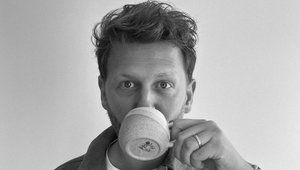
Why Toby Walsham Believes It’s Time for a Change in the Pitching Process

Toby Walsham is the founder and CEO of global creative studio Imagine This and AI studio Made by Humans, bridging the gap between creative strategy, production, artist representation and emerging technologies.
With a storied career as an executive producer, managing director and business owner, Toby has not just navigated but mastered the complex landscape of international production. His knack for nurturing remarkable talent and collaborating with top-tier creatives has marked him as a specialist producer of high repute.
The art of producing and entrepreneurship, to Toby, is like an ever-evolving three-dimensional puzzle, each day presenting its own set of challenges and opportunities. His passion lies in crafting creative solutions that not only address but transcend client needs, making every project an exciting journey of discovery and innovation.
LBB> In one sentence, what’s the issue on your mind right now?
Toby> Bad behaviour is not being punished when it comes to agencies or brands leading production companies on and wasting valuable treatment and pitch resources, and we continue to say, “Thank you for the opportunity” when we really mean, “Thank you for wasting my time.”
LBB> Now explain any additional context or detail.
Toby> I’ve personally experienced five single bids turn to dust this year, and I’m hearing similar stories from other business owners.
Our time is being wasted on projects that were never going to happen, and there’s a real lack of both transparency and accountability on the client side.
We need to call out this bad behaviour.
It is unacceptable to put people to work, unpaid, under the pretence of a single bid or even under a triple bid, only to then not move forward with the project.
We’re talking weeks of hard work…building pitch decks, treatments, budgets, and countless phone calls, etc and all of which end with a “sorry, we’re not moving forward with this project”. It’s frustrating, time-consuming, and disrespectful.
LBB> Why does it matter to you?
Toby> It matters because for small to medium-sized companies, like most production businesses, all eggs are often in one basket.
We don’t have the resources to bid on 10 jobs at once. Instead, we finesse and craft a few pitches at a time. When they’re pulled from us, never made, or worse, never even existed in the first place (the agency producer actually got fired for this one), it hurts our businesses, burns out our creative talent, and undermines our reputation with our artists.
LBB> Why does it matter enough to the wider industry?
Toby> This is not just an Imagine This problem; it’s an industry-wide issue. Potential clients continue to take advantage of the system, knowing they can get away with it.
We all contribute to an ecosystem, and when anyone wastes a small-to-medium-sized business’s time and uses their resources poorly, it needs to be corrected.
Pre-Covid, when I lost a pitch, I knew another opportunity would come within months. But now, the agency model seems so disjointed, so remote, that I’m not even sure agencies know who their fellow producers are, let alone who to share intel with.
This disconnect is damaging the industry, and it’s only going to get worse if we don’t address it.
LBB> Why does it remain an issue?
Toby> It remains an issue because there’s no real consequence for bad behaviour in the industry. Time and time again they continue to exploit the system because they know they can. We’re operating in an environment where it’s become normalised to work on pitches and treatments for free, wasting time and resources. The culture of ‘don’t bite the hand that feeds you’ keeps this issue from being challenged. Until we hold people accountable for their actions, this will continue to be a problem, and wear away the viability of smaller, independent production studios.
LBB> What should we be doing about it?
Toby> No one should be putting work out to scope without first getting brand approval on the script and budget. The person being asked to pitch should know exactly who they’re bidding against. This isn’t just about fairness. It's about giving the business owners real insight into whether or not it’s a good commercial decision, saving everyone time and energy in the long run. When I know who I’m up against, it’s honestly just far more exciting. It becomes a race; even if you think you’re the best candidate for the job, there’s still everything to play for. But far more fun to know you’re the underdog and pull out all the stops to take it home.
LBB> And what are the first steps?
Toby> The first step is making transparency a standard practice. Agencies should be required to provide insight into who their clients are considering and be upfront about the competition. This simple change can save time, prevent wasted energy, and create a more fair playing field. But more importantly, we need to start calling out bad behavior when we see it and stop letting people off the hook.
LBB> Are there any people or businesses leading the way?
Toby> Yes, my recent experience working with Code and Theory was fantastic. They have a great management team and an outstanding producer who kept me fully informed about the potential pitfalls of the project from the start. While I wasn’t aware of who I was up against, it was still a transparent pitch. Every element of the production was clearly laid out for both me and the director. That’s how it should be. When transparency is prioritised, it’s a smoother process for everyone. We’ve also experienced much less of this issue when working directly with brands, who already have their creative ideas signed off before asking us to get involved. These clients also more often involve us much more heavily in the creative process from the get-go.
LBB> Any parting thoughts?
Toby> As a production community, let’s collectively stop saying “thank you for the opportunity” when we have invested valuable time, energy, money, and resource which goes to waste, and lets start: A) charging people for single-bid treatments that fall through, and B) start calling out clients for misleading us and wasting our time. Candid feedback is needed, and will result in a better industry tomorrow.















